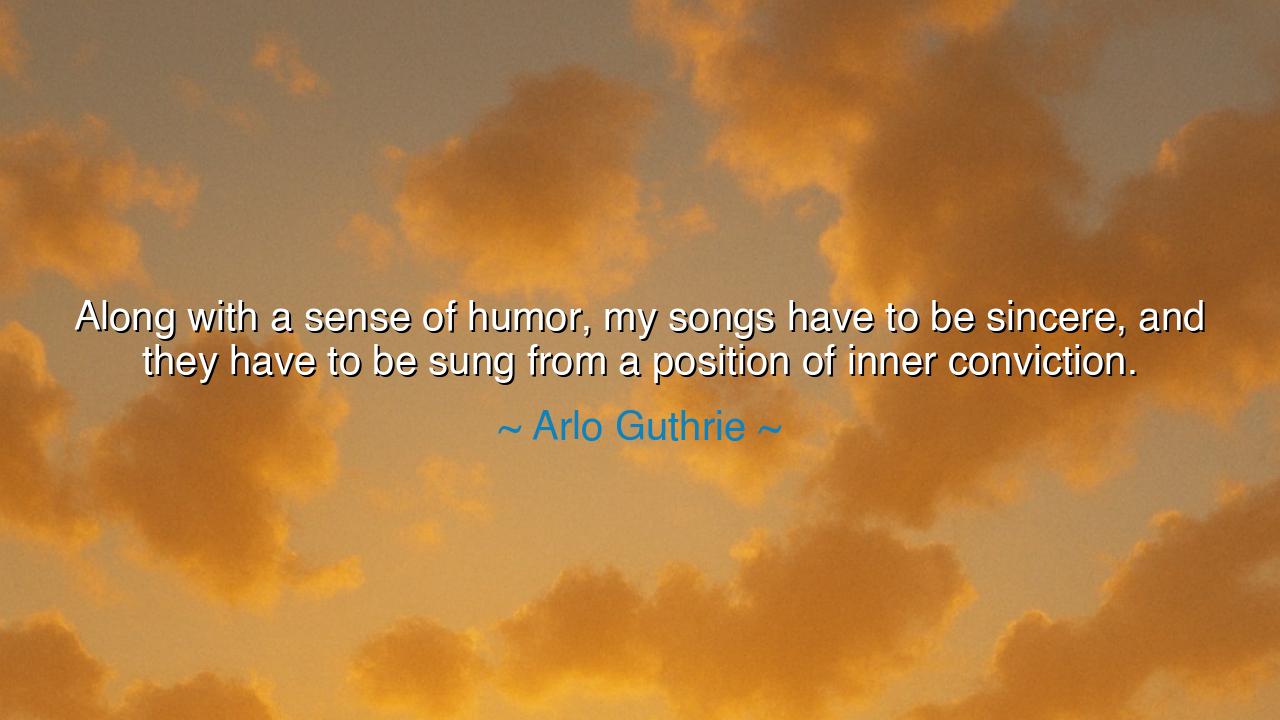
Along with a sense of humor, my songs have to be sincere, and
Along with a sense of humor, my songs have to be sincere, and they have to be sung from a position of inner conviction.






In the eternal flow of existence, where human hearts beat in rhythm with the world around them, there are those who possess the gift of transforming their inner thoughts, their deepest convictions, into song. Such a soul was Arlo Guthrie, whose voice carries the weight of truth and the spark of joy in its purest form. When Guthrie declares, "Along with a sense of humor, my songs have to be sincere, and they have to be sung from a position of inner conviction," he speaks not only to the essence of music, but to the soul of the artist. His words resonate with the ancient truth that humor and sincerity are not opposing forces, but companions in the journey of expression, both necessary to reach the hearts of those who listen.
From the beginning of time, the great bards and storytellers understood that the power of a song or tale lies not just in the melody or the plot, but in the truth it conveys. They knew that the stories sung around the fire or spoken beneath the stars had to be delivered with both the weight of conviction and the lightness of humor. In ancient Greece, Homer sang of gods and heroes, not as distant figures, but as beings whose flaws, passions, and struggles mirrored the human condition. The gods were often depicted with a sense of irony, for even they, despite their powers, faced dilemmas of the heart, of love, and of justice. It was in the interplay of these human elements—serious and light—that the true meaning of the story was found.
Guthrie's words reflect this ancient wisdom, showing that for an artist, humor must complement sincerity, not obscure it. The songs that Guthrie crafts are not mere entertainments; they are calls to action, an invitation to listen, to reflect, and to change. Yet, even in their most solemn moments, they carry a thread of humor, a reminder that life is a dance between the joyous and the tragic. It is the balance of these forces that creates the resonance that touches the heart. A song without sincerity is hollow, but a song that lacks humor becomes a burden—too heavy to bear, and too distant to reach the listener's soul.
The great poets of antiquity understood this delicate balance. Homer, again, wove humor and gravity into his epics, whether it was in the absurdity of Odysseus's adventures or the painful sorrow of Achilles. The ancient Greeks saw the value in laughter as a form of relief, a way to process and deal with life's complexities. They also knew that humor, when used rightly, could convey deep truths—truths that reason alone could not reach. Laughter was not to diminish the weight of life, but to give release and perspective. It is a concept that Guthrie embraces, for he knows that without humor, sincerity can become stifling; without sincerity, humor can become shallow.
Consider, too, the legacy of the minstrels and folk singers of medieval times. These wandering bards sang songs of heroes, tragedies, and the beauty of the land. But their songs were never merely entertainment. In them, there was always a sense of conviction, a belief in the power of storytelling to effect change. One such minstrel, William Shakespeare, though known for his weighty tragedies, also brought forth brilliant comedies, where deep truths about human nature were explored through humor. His plays are a testament to the ancient understanding that the soul requires both laughter and reflection to find peace.
Guthrie’s quote, then, is a reminder to all who create, to all who speak or sing, that the greatest works are born from a place of deep conviction. If we speak from the heart, with sincerity and humor, our words will touch others in ways that reason alone cannot. This is not to say that every moment of our lives must be a performance, but that, as artists or as human beings, we must live our truth and express it honestly. There must be no pretense, no facade, for the heart of the message will always shine through. Humor does not diminish the message—it enhances it, allowing us to hear its truth more clearly and to embrace it more fully.
Thus, the lesson is clear. As we move through our lives, we must strive to find that balance between humor and conviction. Whether we are speaking to a friend, singing a song, or standing before a crowd, we must speak from a place of truth. And just as Guthrie sings from his heart, so too must we find our own inner song—one that is sincere and full of life, but also full of the lightness that comes from laughter. For it is this combination that makes the human experience not just bearable, but beautiful—the melody of sincerity mixed with the harmony of humor. Let us embrace both, knowing that through them, we will create a legacy that endures, reaching hearts across time and space.






AAdministratorAdministrator
Welcome, honored guests. Please leave a comment, we will respond soon